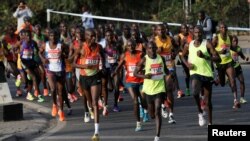"Right now we're in the intensive care unit," said Athletics Kenya official Barnabas Korir, warning the country was moving precariously close to joining Russia as a sporting pariah.
"At this rate Kenya may not survive this year. The writing is on the wall: Kenya is facing a ban and its athletes will not be able to compete internationally," Korir told AFP.
Most of those suspended or banned for violating Athletics Integrity Unit (AIU) anti-doping rules this year are involved in road and marathon running, where the huge prize money up for grabs has helped fuel the corrupt practice.
Among the top names are 2021 Boston marathon champion Diana Kipyokei and marathon and mountain racer Mark Kangogo.
The AIU said last month that 10 Kenyan athletes had tested positive in 2021-22 for triamcinolone acetonide, which was still allowed in some forms last year before being banned in January.
Two popular drugs of choice are Norandrosterone and triamcinolone acetonide -- the latter is used for weight loss, muscle building and endurance and has long been part of doping in cycling.
Anti-Doping Agency of Kenya (ADAK) head Sarah Shibutse attributed the surge in cases in part to the long Covid-enforced lull in competitions that left runners idle.
Shibutse noted that many Kenyan athletes come from poor backgrounds, and rely on their sport to earn livelihoods for themselves and their extended families.
And when races finally resumed after the lifting of pandemic restrictions, competition was stiff, Shibutse said in an interview with AFP.
"This gave quite a number of them the impetus that 'I would rather dope so that I can participate in these competitions and win, than just say that I have trained enough and my talent will get me there'."
She also blamed agents, coaches and managers for pushing the athletes too hard to succeed and make up for their own lost earnings.
According to the AIU, a total of 138 Kenyan athletes across all sports had tested positive for prohibited substances between 2004 and August 2018.
Rita Jeptoo, a multiple Chicago and Boston marathon winner, and Jemima Sumgong, who won the Rio Olympic title in 2016, were among those banned for taking the bloodboosting Erythropoietin (EPO).
And in 2019, Asbel Kiprop, the 2008 Olympic and three-time world 1500m champion, was given a four-year ban after testing positive for the drug.
"We've been doing a good job getting Kenyan dopers using other substances like steroids, EPO and blood doping," AIU head Brett Clothier said in a recent television interview.
"But there's an attempt to evade detection by using a substance that can be used therapeutically with the right medical excuse," he added.
"Fortunately with our intelligence, in assistance with our local partner in ADAK, we've managed to get on top of this quickly and discovered what was going on."
Last month, Athletics Kenya unveiled a raft of measures including tightening registration rules at training camps for agents, support staff and clinical officers -- those who administer medication.
Kenya's new Sports Minister Ababu Namwamba has promised to move with haste and start cleaning up the mess.
But in an editorial last month headlined "Slay the doping dragon", Kenya's leading newspaper the Daily Nation lamented: "The spiralling cases appear to be a mockery of the efforts."
